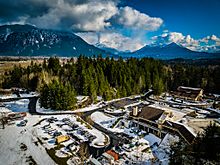Snoqualmie Indian Tribe facts for kids
| sdukʷalbixʷ | |
|---|---|

Snoqualmie Tribal Government Campus,
Snoqualmie, Washington |
|
| Total population | |
| approximately 650 | |
| Regions with significant populations | |
| City of Snoqualmie City of North Bend Greater Seattle Area |
|
| Languages | |
| English, Southern Lushootseed | |
| Religion | |
| Christianity, traditional tribal religion | |
| Related ethnic groups | |
| other Snoqualmie people |
The Snoqualmie Indian Tribe is a group of Native American people. They are known in their own language as Lushootseed: sdukʷalbixʷ. This tribe is officially recognized by the United States government. The Snoqualmie people are part of the Coast Salish group. They originally lived in the Snoqualmie Valley area of Washington state. This area is in what is now King and Snohomish Counties.
History of the Snoqualmie Tribe
The Snoqualmie people have a long history in the Puget Sound region. Long ago, they were one of the largest tribes there, with about 4,000 members.
Early Agreements and Land
In 1855, the Snoqualmie Tribe signed the Point Elliott Treaty with the Washington Territory. Some Snoqualmie people moved to the Tulalip Reservation after this treaty. However, many chose to stay in their traditional lands. These lands were around the Snoqualmie Valley and Lake Sammamish.
Federal Recognition and Land Ownership
For a time, the Snoqualmie Tribe lost its official recognition from the United States government. This happened in 1953. But in October 1999, the Bureau of Indian Affairs officially recognized the Snoqualmie Tribe again.
After regaining recognition, the tribe bought land near Snoqualmie, Washington. This land became their official reservation. In 2008, the tribe opened the Snoqualmie Casino on this reservation.
The tribe has also worked to get back more of their ancestral lands. In late 2021, they bought the Snoqualmie Tribe Ancestral Forest. This forest covers about 12,000 acres (4,900 hectares) in East King County. This land is very important to the tribe for its history, environment, and economy. The tribe plans to manage the forest carefully. They will harvest timber in a way that helps the environment. They will also protect the native plants and animals that live there.

